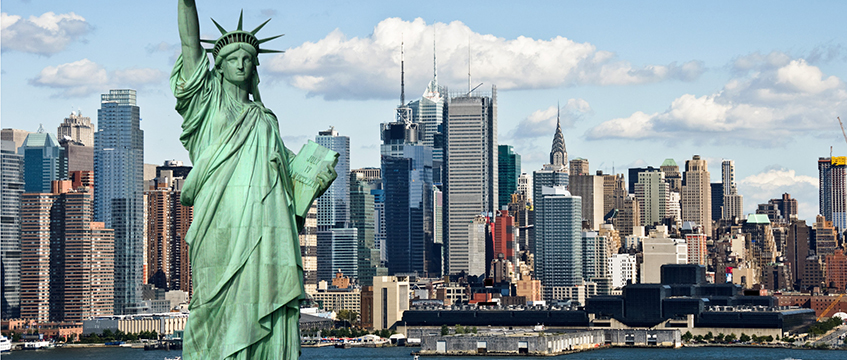Trump election fails to deter US property investment
The US real estate market is weathering the shock of the election of Donald Trump and most major investors are still eager to be active in the market, according to panellists at EG’s Backing the Best Global Cities debate at MIPIM today.
Buoyed by Trump’s multi-trillion-dollar investment ambitions into infrastructure, investors, particularly major institutions in the Far East, are seeing it as a safe and more straightforward region to place their equity over Europe.
“I have been surprised by what has been happening in the US, where investors seem to be just as keen to invest despite Trump, or perhaps even more so because of his real estate background,” said Alice Breheny, global head of research at TH Real Estate.
The US real estate market is weathering the shock of the election of Donald Trump and most major investors are still eager to be active in the market, according to panellists at EG’s Backing the Best Global Cities debate at MIPIM today.
Buoyed by Trump’s multi-trillion-dollar investment ambitions into infrastructure, investors, particularly major institutions in the Far East, are seeing it as a safe and more straightforward region to place their equity over Europe.
“I have been surprised by what has been happening in the US, where investors seem to be just as keen to invest despite Trump, or perhaps even more so because of his real estate background,” said Alice Breheny, global head of research at TH Real Estate.
“We do roadshows throughout Asia Pacific and, interestingly, people make the US a priority over Europe as it is a more straightforward place to invest and from the outside the US political problems appear to be less.”
There is also a sense of relative value to be found in the US compared with prime markets in Europe, where yields in some areas have dropped to record lows.
“I think confidence in the US will hold and there is strong interest from French investors and from some in the Far East, such as Korean investors. The economy is good and yields are now very aggressive in Europe. I would rather buy high street retail in the US at 4% than in Paris at 3.5%,” said Paul Boursican, international partner at Cushman & Wakefield.
This view was not shared universally, however, and Nick Laird, chief executive of Anvil, was highly sceptical of the US economy and real estate sector, directly because of Trump and the chaos he could cause.
“He takes advice from no one, never has and is not about to start. I am very sceptical he will make it through the four years. It will be great until the party stops. I would not be buying an asset that didn’t have a lease length longer than his planned presidency and at least two years after that to sort out the problems,” he said.
Best global city?
Jackie Newstead, global head of real estate, Hogan Lovells
There are so many different measure you could use to decide on which cities are the world’s best.
There have been numerous surveys based on different criteria which have produced wildly divergent results. When it comes to the best city to live in though, a lot of it is subjective and will depend on one’s perspective on life: things like age, marital status, children, hobbies and other interests, as well as more directly measurable criteria.
The best cities to live in may not be the most successful cities economically and some of the best cities to work in may not be particularly amenable places to live in. For me, the best cities are the ones that provide a balance between economic success and being pleasant places to live; the ones that have thriving business districts, but also provide the full range of facilities to enjoy in one’s leisure time and the essential services that we and our families need. They have the best shops, restaurants, theatres, cinemas, museums, galleries, parks, sporting venues, schools and hospitals. They are cities that have iconic buildings and are immediately recognisable. They have a buzz about them.
My best cities are the ones that have an identity of their own, that recognise their cultural heritage but are also embracing the digital revolution. They are ambitious cities that keep striving to get ahead. That puts London, San Francisco and New York at the top of my list. I would also add Tokyo and Singapore to make up my top five.
Best global city?
Nick Laird, chief executive, Anvil
I think Trump is a very short-term focused individual and will do things that will see the economy boom for no more than 18 months. Then people will look around and say, “Wow we’re not really doing for the country what the US really needs,” and we will be in a much worse place than we are today.
However, I have lived in New York three different times in my life for a total of 15 years and it’s the most dynamic, resilient place I’ve experienced anywhere in the world and I have lived in six or seven countries. No one is from NY but everyone goes there to try and promote themselves and that dynamic creates massive amounts of ambition and innovation and the things that make a city great. It’s very intense, it’s not for everyone, not even me at my age, but I can’t image a place that has more long-term potential.
The panel
Jackie Newstead, global head of real estate, Hogan Lovells
Paul Boursican, international partner, Cushman & Wakefield
Alice Breheny, global head of research, TH Real Estate
Nick Laird, chief executive, Anvil (Oslo)
Aqil Kazam, chief commercial officer, Nakheer
Chaired by Emily Wright
Click here for all the news, views and analysis from MIPIM 2017











